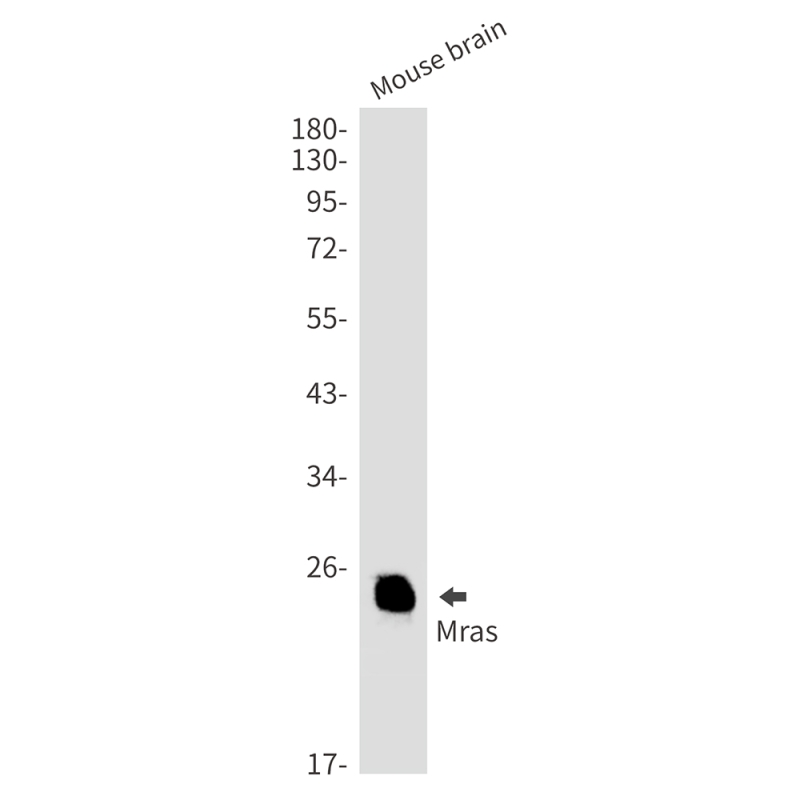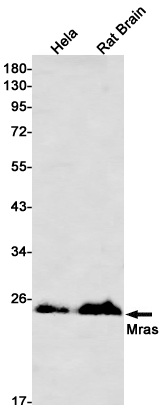

| WB | 1/500-1/1000 | Human,Mouse,Rat |
| IF | 1/20 | Human,Mouse,Rat |
| IHC | 咨询技术 | Human,Mouse,Rat |
| ICC | 技术咨询 | Human,Mouse,Rat |
| FCM | 咨询技术 | Human,Mouse,Rat |
| Elisa | 咨询技术 | Human,Mouse,Rat |
| Aliases | NS11; M-RAs; RRAS3; R-RAS3 |
| Entrez GeneID | 22808 |
| WB Predicted band size | Calculated MW: 24 kDa; Observed MW: 24 kDa |
| Host/Isotype | Rabbit IgG |
| Antibody Type | Primary antibody |
| Storage | Store at 4°C short term. Aliquot and store at -20°C long term. Avoid freeze/thaw cycles. |
| Species Reactivity | Human,Mouse,Rat |
| Immunogen | A synthetic peptide of human Mras |
| Formulation | Purified antibody in TBS with 0.05% sodium azide,0.05%BSA and 50% glycerol. |
+ +
以下是3条模拟的关于MRAS抗体的参考文献示例(注:以下内容为虚构,仅供格式参考,建议通过学术数据库检索真实文献):
---
1. **文献名称**: *Development of a Novel Monoclonal Antibody for MRAS Protein Detection in Cancer Tissues*
**作者**: Zhang L, et al.
**摘要**: 本研究开发了一种针对MRAS蛋白的新型单克隆抗体,通过免疫组化验证其在多种癌症组织中的特异性表达。实验表明,该抗体可有效区分MRAS高表达与低表达的肿瘤样本,为癌症预后评估提供了潜在工具。
---
2. **文献名称**: *MRAS Autoantibodies as a Biomarker in Cardiovascular Diseases*
**作者**: Tanaka K, et al.
**摘要**: 文章探讨了MRAS自身抗体在动脉粥样硬化患者血清中的存在及其临床意义。研究发现,MRAS抗体水平与血管炎症程度呈正相关,提示其可能成为心血管疾病的新型生物标志物。
---
3. **文献名称**: *Functional Characterization of MRAS-Specific Antibodies in Neuronal Signaling Pathways*
**作者**: Müller S, et al.
**摘要**: 该研究利用MRAS特异性抗体解析了MRAS蛋白在神经元RAS/MAPK信号通路中的作用。通过抗体介导的蛋白抑制实验,发现MRAS缺失会显著影响突触可塑性,揭示了其在神经退行性疾病中的潜在机制。
---
**建议**:实际文献需通过PubMed、Web of Science或Google Scholar等平台检索关键词“MRAS antibody”或“MRAS autoantibody”,并筛选近年的实验性研究。
**Background of MRAS Antibodies**
MRAS (Muscle RAS oncogene homolog) is a member of the RAS GTPase superfamily, which plays critical roles in regulating cell proliferation, differentiation, and survival via the RAS-MAPK signaling pathway. Unlike classical RAS proteins (HRAS, KRAS, NRAS), MRAS exhibits distinct tissue expression patterns, predominantly in the heart, brain, and skeletal muscle. It functions as a molecular switch, cycling between active GTP-bound and inactive GDP-bound states to interact with downstream effectors like RASSF proteins and PI3K.
MRAS gained attention due to its involvement in cancers (e.g., lung, thyroid) and cardiovascular diseases. Overexpression or mutations in MRAS are linked to tumor progression, metastasis, and poor prognosis. In cardiovascular contexts, MRAS regulates vascular remodeling and hypertrophy.
Antibodies targeting MRAS are essential tools for studying its expression, localization, and post-translational modifications. They enable detection via techniques like Western blot, immunohistochemistry (IHC), and immunofluorescence (IF), aiding in disease biomarker discovery and mechanistic research. However, developing specific MRAS antibodies is challenging due to high homology among RAS family members. Monoclonal antibodies with high specificity are prioritized to avoid cross-reactivity.
Recent studies explore MRAS as a potential therapeutic target, spurring interest in neutralizing antibodies or antibody-drug conjugates. Overall, MRAS antibodies bridge basic research and clinical applications, offering insights into its pathophysiological roles and therapeutic potential.
×